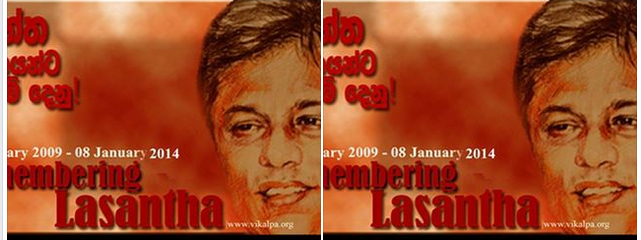The International Federation of Journalists (IFJ) joins its affiliates the Free Media Movement (FMM) and the Sri Lanka Working Journalists Association (SLWJA) in welcoming the Sri Lankan government’s decision to reopen investigations into the murder of editor Lasantha Wickrematunge in 2009.
Wickrematunge, the founder and editor of The Sunday Leader, was assassinated in January 8, 2009, by four assailants who stopped him on his way to his office and opened fire at him. Wickrematunge was a vocal critic of former president Mahinda Rajapaksa’s government and at the time of his murder was involved in a legal fight with Rajapaksa’s brother, the then-defense secretary Gotabaya Rajapaksa.
According to reports, the new Sri Lankan government’s decision to reopen the investigation came after a former cabinet minister publicly accused Gotabhaya Rajapaksa, the brother of former president Mahinda Rajapaksa, of ordering the assassination of Wickrematunge. In the presidential election on January 8, 2014, Mahinda Rajapaksa was defeated by Maithripala Sirisena ending the former’s decade-long rule.
Wickrematunge was the recipient posthumously of the UNESCO/Guillermo Cano World Press Freedom Prize in 2009 and was declared a World Press Freedom Hero by the International Press Institute in 2010.
Jane Worthington, the IFJ Asia Pacific acting director, said: “The murder of Lasantha Wickrematunge was intended to send a strong message and there is no doubt it had a chilling effect on Sri Lanka’s media. Lasantha was a man highly regarded for his bravery and defence of press freedom in the face of threats and attacks that were ultimately the precursor to his death. The significance of the reopening of this investigation cannot be underplayed.”
In his final editorial, published after his assassination, Wickrematunge wrote: “When finally I am killed, it will be the government that kills me.” He also wrote that his hoped his murder would not be interpreted as a “defeat of press freedom but as an inspiration”.
In the years since the end of Sri Lanka’s long-running civil war and estimated more than 80 journalists have fled the country.
The IFJ says the decision by the new Sri Lankan government to reopen the investigation into the murder of Lasantha sends a promising message about a new future for press freedom and democracy in Sri Lanka, which is part of the new government’s 100 day work program.”
Welcoming the decision, the SLWJA has called upon the new government to investigate all other attacks on media including the disappearance of Prageeth Ekneligoda, abduction and assault of Poddala Jayantha and Keith Noyer, and attacks on Uthayan, Sirasa and Sunday Leader newspapers.
Prior to the election, the Free Media Movement, Sri Lanka, met with Sirisena and put forward a media reform proposal. Part of the reforms include ending impunity on crimes against journalists, and this step by the President looks like positive progress for Sri Lanka’s media reform.
FMM also said that they welcomed the decision to reopen the case of Lasantha Wickrematunge.
The IFJ added the new government of Sri Lanka has an opportunity to ensure democratic governance by ensuring complete media freedom, and reopening Lasantha Wickrematunge murder investigation is an important part.
The IFJ added: “We urge the Sri Lankan government deploy all state resources to ensure justice in this high-profile and emblematic case of impunity. Justice for the murder of Wickrematunge will go a long way in addressing the country’s dire impunity record.”
According to Committee to Protect Journalists’ Impunity Index 2014, Sri Lanka is ranked fourth in the world for failing to address impunity in the nine murders of journalists in last 10 years – Wickrematunge’s being one of them. The high level of threat against journalists and impunity have also forced a number of journalists to go on exile
